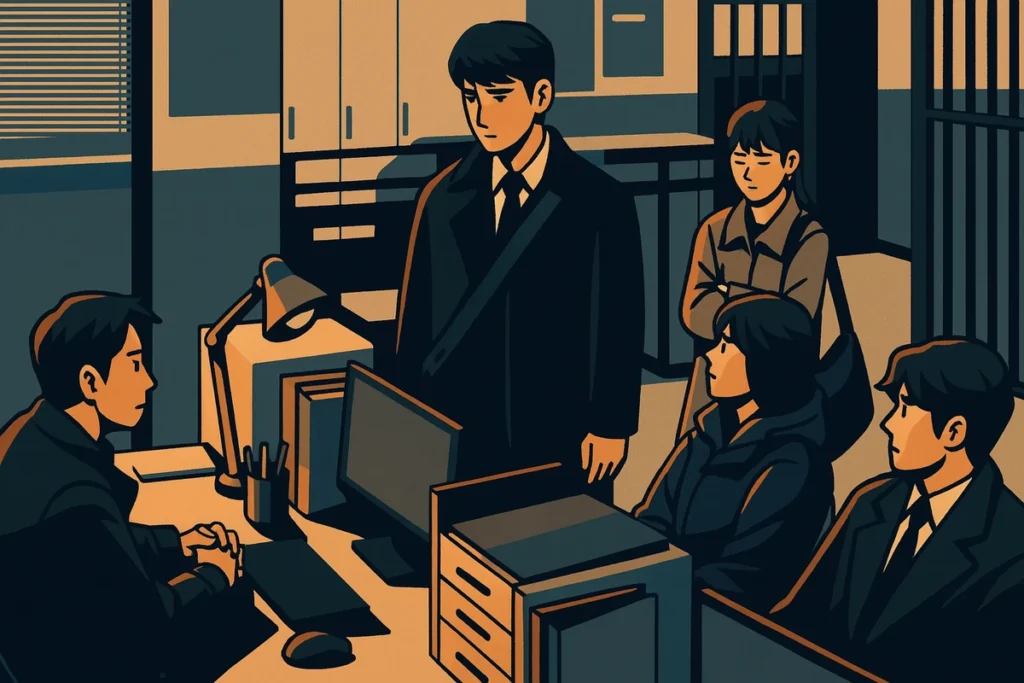[Image Source] AI illustration by DALL·E
TL;DR – Learn Korean Through Noir: “Mercy for None” (Funeral Scene)

1. Scene Snapshot
A rain-damp funeral hall. White chrysanthemum wreaths crowd the walls while black suits move in practiced lines. A man who vanished from the underworld over a decade ago steps back into the light to mourn his younger brother. Seniors bow with rigid precision; juniors steal glances, measuring danger. The air is thick with unsaid rules—who may speak first, who must bow, how low, how long. When answers sound slippery, the visitor reminds the elders of an old promise. His tone is steady, his gaze colder than the steel incense tongs on the altar. In Korean, grief often travels through restrained words and careful honorifics; here, the politeness feels like a fuse already lit.
📺 Watch the original scene here
[Source] YouTube, @라마의드라마
2. Micro-Dialogue (Reconstructed, not quoted)
2-1. 성철아, 한마디만 하자.
Seong-cheol, give me a minute.
2-2. 남 전무님 형님 모셨다. 정중히 인사해.
This is Director Nam’s elder brother. Bow properly.
2-3. 그 사람, 어디 있지?
Where is he?
2-4. 열한 해 전 그 약속, 아직 잊지 않으셨죠?
You remember the promise from eleven years ago.
2-5. 오늘만큼은 죽은 듯 살라는 말씀, 못 따르겠습니다.
Nam Gi-jun: For today at least, I can’t live as if I’m dead.
3. Culture & Subtext
Korean gangster etiquette borrows heavily from corporate and military hierarchies. Titles outrank names; order of greeting matters; bows communicate allegiance. In a funeral hall, respect intensifies: juniors often bow close to 90 degrees and choose deferential verbs like 드리다 for “to give” when the object is a superior (인사드리다 means “to pay respects”). Notice how warmth and ice coexist: vocative endings like -아/-야 (“성철아”) create closeness, while the rest of the utterance can carry threat or judgment. The scene also plays with ellipsis—sentences trail off, subjects drop, and a single noun phrase (“그 약속…”) can reopen old wounds. Slang spices the narrator’s tone: 인사를 박다 literally sounds like “slam a greeting,” a cheeky way to describe an overly crisp bow; ㅈ됨 is a vulgar shorthand for “being screwed,” signaling that everyone feels the weather turning.
❓ FAQ (Frequently Asked Questions)
Q1. Is “Mercy for None” really based on a webtoon? Which one?
Yes. It adapts Plaza Wars: Mercy for None by Oh Se-hyung & Kim Gyun-tae (WEBTOON EN). Netflix’s official guide confirms this. (www.webtoons.com, Netflix)
Q2. When was it released, and where can I watch it?
It premiered on June 6, 2025, as a Netflix limited series. (Netflix, IMDb)
Q3. I see “Lee Ju-woon / Lee Ju-un / Lee Joo-eun” for the boss’s name. Which is correct?
Romanization varies across outlets; major databases list Lee Ju-woon / Lee Ju-un for Huh Joon-ho’s character. (Variation comes from spacing/diphthong choices in romanization.) (Wikipedia, Rotten Tomatoes)
Q4. What does “깍듯하게 인사를 박다” mean? Is “박다” rude?
It’s playful narration meaning “to bow very respectfully (almost ‘slam a greeting’).” 박다 literally “to drive/ram,” but in slang can intensify an action (“hit a bow”). Casual sources explain this usage in net-slang contexts. Use it only in descriptive, humorous narration—not to command someone.
Q5. What does “ㅈ됨(을 감지하다)” mean? Can I use it?
ㅈ됨 abbreviates 좆됐다 → “I’m screwed / it’s f***ed.” It’s strongly vulgar; understand it for comprehension, but don’t say it in polite settings. (Flexi Classes)
Q6. Why do gangsters say “형님 (hyungnim)” to seniors?
Korean address terms extend beyond family into hierarchies; 형님 is the honorific “elder brother (male→male).” In Korean mafia contexts, the boss is commonly addressed as 형님. (General honorifics overview + gang term notes.) (Wikipedia)
Q7. “전무(이사)” in the line “남전무”—what’s the best English?
Companies vary, but “Executive Director / “Senior Managing Director” are standard translations for “전무(이사)“. (Corporate-title guides discuss the mapping differences.)
Q8. How many bows at a Korean funeral hall? Which hand is on top?
Typical modern etiquette: two bows to the deceased, one bow to the family; men place right over left, women left over right. (Practice can vary by religion/region—observing others is safe.) (Korea Joongang Daily, Wikipedia)
Q9. Is condolence money (부의금) expected? What about envelopes and a dress?
Yes—black attire is standard, and visitors often bring condolence money in a white funeral envelope labeled 부의; exact amounts vary. Multiple practical guides and community threads cover the flow (guest book → altar → bows → simple meal). (Reddit)
Q10. The scene shows deep bows and a quiet, tense meal afterward. Is that realistic?
Hospital-based funeral halls with an altar room plus reception/dining area are familiar today; brief bows, incense/flower offering, then a simple shared meal is typical. (Wikipedia)
Q11. Why does Gi-jun switch between very formal and familiar tones?
That’s core Korean pragmatics: deference upward (honorifics to seniors) vs. casual downward (to juniors/close peers). Noir dramas exaggerate this contrast for tension. See learner explainers on honorific systems frequently referenced by K-drama fans. (Reddit)
4. Grammar in Action
4-1. “성철아, 한마디만 하자.”
🔍 Analysis
• 성철아: vocative -아 (informal call to someone whose name ends with a vowel)
• 한마디만: 한(one) + 마디(word) + 만(only/just)
• 하자: proposal ending -자 (“let’s do”)
📌 Example Usage
“지훈아, 잠깐만 보자.”
“Jihoon, let’s talk for a minute.”
☀️ Meaning
Closeness with control. The speaker signals familiarity yet takes the lead in the interaction. –
4-2. “회장님께 먼저 인사드려.”
🔍 Analysis
• 회장님께: honorific dative 께 (“to the chairman”)
• 먼저: first, before anything else
• 인사드려: 인사(greeting) + 드리다(humble give) → imperative contraction (“pay respects”)
📌 Example Usage
“선생님께 감사 인사드려.”
“Offer your thanks to the teacher.”
☀️ Meaning
Hierarchy embedded in wording: humble verb + honorific case marks a polite command that still carries weight. –
4-3. “다신 여기 얼굴 비추지 않기로 했지.”
🔍 Analysis
• 다신: contraction of 다시는 (“never again”)
• 얼굴 비추다: “to show one’s face,” casual ‘appear’
• -지 않기로 하다: decision/promise construction (“decided not to”)
• -지: friendly tag, softening while reminding
📌 Example Usage
“이번 일은 다시는 입 밖에 내지 않기로 했지.”
“We decided never to speak of this again.”
☀️ Meaning
A reminder of a prior agreement—soft phrasing, hard boundary. It nudges and accuses at once. –
4-4. “오늘만큼은 조용히 못 있겠습니다.”
🔍 Analysis
• 오늘만큼은: -만큼은 adds contrastive emphasis (“at least today”)
• 조용히: quietly, in a restrained manner
• 못 있겠습니다: 못(negation of ability/will) + 있- + 겠습니다(formal stance/resolve)
📌 Example Usage
“이번만큼은 그냥 넘어갈 수 없겠습니다.”
“For this time at least, I can’t let it slide.”
☀️ Meaning
A respectful but unyielding stand: today is the exception to self-restraint. –
4-5. “가출한 애들이랑 엮여서 일이 커졌대요.”
🔍 Analysis
• 가출한: adnominal of 가출하다 (“run away from home”)
• 애들이랑: colloquial “with the kids” (-이랑 = with)
• 엮여서: passive 엮이다(“get entangled”) + -어서(cause/background)
• 커졌다: the past tense of 커지다(“expand, grow, increase”)
• -대요: hearsay/reporting ending (“I hear that…”)
📌 Example Usage
“쓸데없는 소문에 엮여서 곤란해졌대.”
“I heard he got in trouble after getting tangled in useless rumors.”
☀️ Meaning
Reports involvement at arm’s length—conveys blame without direct accusation, preserving deniability.
5. Natural Korean Toolkit
– Respect ladder for greetings
인사하다 → 인사드리다(humble to superior) → 정중히 인사드리다(“politely pay respects”)
– Bow nuance
꾸벅(brief nod), 허리 숙여 인사(standard), 깍듯이 인사(near 90°, very formal).
– Show up vs. re-emerge
얼굴을 비추다(casual “show one’s face”) vs. 모습을 드러내다(literary “reveal oneself,” often after absence).
– Get entangled
엮이다(passive, negative tinge) ≈ 말려들다(get dragged in) ≈ 휘말리다(get caught up).
– Promise/decision grammar
-기로 하다(decide) / 약속을 지키다(keep a promise) / 약속을 어기다(break a promise).
– Contrast and exception
-만큼은(“at least/especially this time”), 하필(“of all times”), 설마(“surely not,” disbelief).
– Streety narrator color
인사를 박다(playful, “slam a greeting”) is slangy; use cautiously and only in informal narration.
– Danger slang
ㅈ됨(very vulgar; “screwed”) appears online/spoken; avoid in polite contexts. Softer alternatives: 큰일 났다, 망했다.
6. Quick Quiz / Expression Drill
Fill in the blank with the right particle or ending.
6-1. 회장님____ 인사드렸습니다.
6-2. 다시는 여기 얼굴을 비추지 않____ 했죠.
6-3. 오늘____은 조용히 못 있겠어요.
6-4. 가출한 애들____ 엮여서 일이 커졌대.
6-5. 성철____, 잠깐 보자.
Choose the more appropriate phrase for a formal setting.
6-6. 인사하다 vs 인사드리다
6-7. 얼굴을 비추다 vs 모습을 드러내다
Translate to Korean.
6-8. “We decided to keep the promise.”
6-9. “He got dragged into the fight.”
6-10. “At least for today, please understand.”
📍 Want More Like This?
Explore more posts in our Advanced Korean Series and dive deeper into how native speakers express emotion, status, and subtle nuance in real language use.
- 🔖 Korean Honorifics vs. Informal Speech: Master the Basics with Practical Examples
- 🔖 Understanding Korean Ambiguity: A Guide to the Beauty of Multilayered Expressions
- 🔖 Beyond Grammar: The Art of Omission in Korean
Answers: 1) 께 2) 기로 3) 만큼 4) 이랑 5) 아 6) 인사드리다 7) 모습을 드러내다 8) 약속을 지키기로 했어요. 9) 싸움에 말려들었어요. 10) 오늘만큼은 이해해 주세요.
Appendix: Drama Overview & Characters
Overview
Mercy for None (Hangul: 광장, romanized Gwangjang) is a Netflix action-noir limited series released June 6, 2025. It follows Nam Gi-jun, a former enforcer who left the mob years earlier; after his younger brother is killed, he returns to uncover the truth and take revenge. The series is based on the WEBTOON Plaza Wars: Mercy for None, written by O Se-hyung with art by Kim Gyun-tae. (Netflix)
Key creatives and release
Cast includes So Ji-sub, Huh Joon-ho, Gong Myoung, Choo Young-woo, Ahn Kil-kang, and Cho Han-cheul; Netflix lists Choi Sung-eun and Yoo Ki-seong among the creators. The series premiered globally on June 6, 2025. (Netflix)
Characters (context for this lesson)
• Nam Gi-jun (So Ji-sub): Ex-gangster drawn back by his brother’s death.
• Nam Gi-seok (Lee Jun-hyuk): The younger brother whose death ignites the plot; appears as a special appearance in some reports.
• Lee Joo-woon (Huh Joon-ho): Chairman of the Juwoon group, a father-figure whose decisions haunt the present.
• Gu Bong-san (Ahn Kil-kang): Head of a rival syndicate with a complicated past tie to Gi-jun.
• Choi Seong-cheol (Jo Han-cheul): Senior lieutenant who navigates between loyalty and survival.


